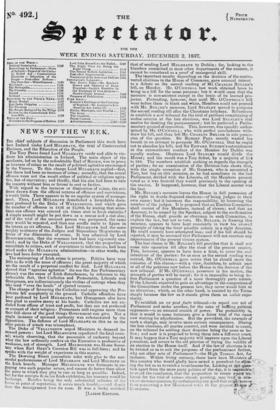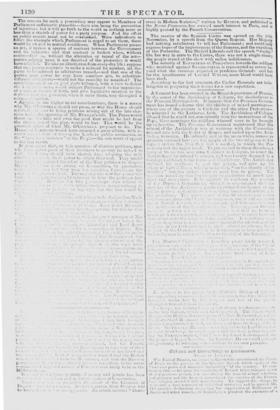NEWS OF THE WEEK.
THE chief subjects of discussion in Parliament this week have been Ireland under Lord MULGRAVE, the trial of Controverted Elections, and the Education of the People.
The Tory Peers found Lord MULGRAVF. ready and able to vin- dicate his administration in Ireland. The main object of the assailants, led on by the redoubtable Earl of Rooz:v, was to prove an increase of crime as the result of political agitation encouraged by the Viceroy. To this charge Lord MULGRAVE replied—first, that there had been no increase of crime; secondly, that the actual offences were not the result either of political or religious agita- tion, but of starvation ; and thirdly, that his aim had been to rule the country without bias or favour to sect or faction.
With regard to the increase or diminution of crime, the evi- dence drawn from the official returns of offences and convictions, is worth little. There appears to be no regular system of arrange- ment. Thus, Lord MULGRA.VE demolished a formidable docu- ment produced by the Duke of 'WELLINGTON, and which gave the number of offences in 1336 at 23,000, by stating that some- times one offence was entered six times over in Irish statistics ! A simple assault might be put down as a rescue and a riot also; and if the trial of the accused person was postponed, the same entry would be repeated, and thus one scuffle made to figure in the return as six offences. But Lord MULGRAVE had the more weighty testimony of the Judges and Stipendiary Magistrates in favour of the diminution of crime. It was admitted by Lord DONOCGIIMORE, that the common law had been vigorously exe- cuted; and by the Duke of WELLINGTON, that the proportion of committals to crimes, and of convictions to indictments, had been raised under the MULGRAVE administration—in other words, the laws had been better executed.
The mainspring of Irish crime is poverty. Politics have very little to do with the mass of offences; the great majority of which are the result of a perpetual conflict for food. Lord MULGRAVE showed that "agrarian agitation" (to use the fine Parliamentary phrase) was the cause of Irish disturbances, by reference to the undeniable fact, that Catholics and Protestants, Liberals and Orangemen, are indiscriminately the victims of outrage when they take land "over the heads" of ejected tenants.
The charge of favouring the Catholics and oppressing the Pro- testants fell completely to the ground. Catholic offenders have been pardoned by Lord MULGRAVE, but Orangemen also have been glad to receive mercy at his hands. Catholics are not ex- cluded from offices of trust and profit, but they are not preferred on account of their religion: Protestants still engross more than their full share of the good things Government can give. Not a single instance of misused authority was substantiated by the Opposition. The defence of Lord MULGRAVE on this as on the other points of attack was triumphant. The Duke of WELLINGTON urged Ministers to demand in- creased powers : but Lord MELBOURNE repudiated the fatal coun- sel; wisely observing, that the possession of authority beyond what the law ordinarily confers on the Executive is productive of weakness, not of strength. Lord MELBOURNE was Hume Secre- tary when Earl GREY'S Coercion Bill was in full force; and be speaks with the weight of experience in this matter.
The Downing Street journalists refer with glee to the suc- cessful performances of Lord MULGRAVE and Lord MORPETII on the Irish boards. Manager MELBOURNE was fortunate in en- gaging two such popular actors, and cannot do better than allow the piece in which they play to run as long as possible. Indeed, but for the receipts front his Irish exhibition, his treasury would be bankrupt. Besides being the only suhstaittial reliance of the house in point of reputation, it saves much trouble,—and dearly dues the management love its ease. It was a lucky accident that of sending Lord MULGRAVE to Dublin ; for, looking to the blunders committed in most other departments of the concern, it cannot be considered as a proof of managerial skill. The important results depending on the decision of the contro- verted elections in the House of Commons, gave unusual interet to a debate on the second reading of Mr.CHaimes BULLER'S bill, on Monday. Mr. O'CONNELL last week obtained leave to bring in a bill for the same purpose; but it would seem that the measure is non-existent except in the brain of its learned pro- jector. Pretending, however, that until Mr. OCoszsteLes bill were before them in black and white, Members could not proceed with Mr. BULLER'S measure, Lord STANLEY moved to postpone the second reading till after the Christmas holydays. Reluctance to establish a new tribunal for the trial of petitions complaining of undue returns at the late elections, was Lord STANLEY'S real motive for desiring the postponement ; but he preferred a Parlia- mentary ground of opposition. This, however, was speedily under- mined by Mr. O'CONNELL; who with perfect nonchalance with- drew his bill, and thus left Mr. CHARLES BULLER in sole posses- sion of the question. Sir ROBERT PEEL merely wasted his breath in an attempt to persuade Mr. O'Cosorer.t. that he ought not to abandon his bill; and Sir EDWARD SUGDILN'S astonishment at the extraordinary conduct of the Member for Dublin was
equally useless. Obstinate Lord STANLEY would divide the
House; and the result was a Tory defeat, by a majority of 214 to 160. The numbers establish nothing as regards the strength of parties; for an examination of the Division-lists shows that,
with the single exception of' Mr. GREENE, who is accounted a Tory, but has on this occasion, as he had sometimes in the last Parliament, divided with the Liberals, all the Members present voted as it was foretold they would previously to the opening of the session. It happened, however, that the Liberal muster was the best.
Mr. BULLER'S measure leaves the House in full possession of the right to decide disputed elections—of being judges in their own cause; but it increases the responsibility, by lessening the number of the judges. It is proposed that an Election Committee shall consist of five Members, instead of eleven; and that an Assessor, to be named by the Speaker, subject to the confirmation of the House, shall preside as chairman its each Committee, to explain the lax, but not to vote. Mr. BULLER, in framing this
measure, appears to have kept constantly in view his avowed principle of taking the least possible reform in a right direction. He could scarcely have attempted less; and if his bill should be rejected, it may be assumed that Parliament will not sanction any improvement of the present vicious system.
The last clause in Mr. BULLER'S bill provides that it shall not come into operation till after the close of the present session.
This, however, appears to have been a feint, to cover the _real
intentions of the parties: for as soon as the second reading was carried, Mr. O'CONNELL gave notice that he should move the omission of this clause,—with a view, doubtless, to submit part or all of the petitions now before the House to the decision of the new tribunal. If Mr. O'CONNELL persevere in his motion, the
strength of parties will be tested; for it is impossible to brio°.b be-
fore Parliament a question of a more thoroughly party nature. If the Liberals expected to gain an advantage in the composition of the Committees under the present law, they never would hint at an alteration ; which, on the other hand, is resisted by the Tories simply because the law as it stands gives them an unfair supe- riority.
To establish an ex post facto tribunal—to repeal one act of Parliament and make another, for the sake of baffling political
opponents—is an unusual stretch of power. The probability is,
that it would in some instances give a fairer trial of the cases now waiting for adjudication. But the precedent, the example of such a change, may involve more serious consequences. During
the late elections, all parties counted, and were entitled to count, on the tribunal for settling their disputes being the same as be-
fore ; and now it is proposed to bring them into a different court.
It may happen that a Tory majority will improve upon the Liberal precedent, and revert to the old practice of trying the validity of
an election in the House itself. And if the law of elections is to be twisted so as to suit the purposes of the predominant faction, why not other acts of Parliament?—the High Treason Act, for instance. Within living memory, there have been Ministers this country who would gladly have seized a precedent for .rittess\7 Mg the law so as to catch a troublesome foe. Looking at tai(; qUes- • tion apart from the mere party politics of the day, it is impossible r", to avJitl the conclusion, that the proposition to create ape* tri- dmal for the trial of causes :dread% pending, may leak Os- tills- cinevous consequences, far outbalancing any good that miitt hcerna. preserving a few Ministerial votes in the present jkluktse
C,in ;nuns.
The reasons for such a proceeding may appear to Members of Parliament butliciently plausible—their aim being the prevention of injustice; but it will go forth to the world as nothing more or less than a stretch of power for a party purpose. A nd the effect on public morals must not be overlooked. Were individuals to follow the example which Parliament is urged to set them, there would be an end to mutual confidence. When Parliament passes an act, it makes a species of contract between the Government and its subjects : and that contract is broken when, without notice—Vie' ,s, without the alteration or repeal of the act— parties ref ', . 7 upon it are deprived of the protection it would haver.... . 1. To take an illustration from every-day life: suppose that ie..:
.et contracts to make a railroad for another, all dis- putes • • 1...ferred to arbitrators named,—and that one of the sswer he may have somehow got, to substitute
effete • ..-see—wuuld not the rascality be manifest: The ese,: • ; cr rest facto tribunal, with a view to defeat ti. -1.-, weld subject Parliament to the imputation
et .: • .itle and give legislative sanction to the d when it suits them, may disregard a *Lists.. _.'.:ion.
A/ L :he higher moral considerations, there is a reason wise ONNELL should not press, or why the House should
r, , si to bring petitions arising out of the late eke-
tee operation of Mr. BI:LLER'S bill. The Peers would bill; and even the good that mieht be had from of the plan, would be lost. This would be the of w hat Mr. O'CoNeeet. prcposes to do. The isiseris would have incurred a great odium, with no ,:f reisine the Lords in public estimation, a te• " " el the Pe ,pie—the safe court of appeal
ti... .11.
II .s s that, on this question of election petitions, men tieer readiness to go very fur Milted to 1 :.;;;s: shrunk floes aIoptine the el e er to attain their end. They moil ths 'rely petitions
see:Rees, by pr.. ee:leo
, f e-soelie oil lii, sue tee I• :.:;-: now the ,wer vir-
reins'.:; tsee the ps•itiees Me:
. two i-dais refuse' 1., e ssures eutieeeii s • this fee e 1,,,,
1■• •-..1.1.
no; but wi.i • qees•ien 01 \:, t', . I ; .1. Lie



























 Previous page
Previous page